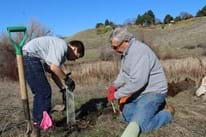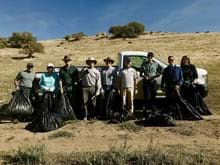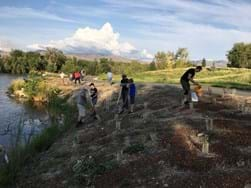What do I have to do?
A minimum commitment of four yearly, seasonally timed, outdoor workdays is required. Habitat management is seasonal and maintenance tasks will shift as the seasons do. General work duties are outlined below by the season in which they should be performed and there are tasks like tree wrapping which can be performed any time of the year. These tasks include but are not limited to:
Winter months:
Invasive trees like Russian olives are best removed in late fall/early winter when plants are preparing for dormancy. Winter tasks may include removal of invasive trees, trash clean-up, dog waste pick-up and other duties as assigned.
Spring months:
 Weeding around restoration plantings and other desirable natives can help habitats flourish. Weeds steal valuable water and soil resources from native plants and can overshadow them. “Haloing” is a technique where a 1.5 foot radius is cleared around a native plant to help protect it from resource competition. In the spring, restoration plantings will be “halo-ed” around and then subsequently mulched.
Weeding around restoration plantings and other desirable natives can help habitats flourish. Weeds steal valuable water and soil resources from native plants and can overshadow them. “Haloing” is a technique where a 1.5 foot radius is cleared around a native plant to help protect it from resource competition. In the spring, restoration plantings will be “halo-ed” around and then subsequently mulched.
Mulching around seedlings helps maintain and sustain soil moisture as temperatures begin to rise in the spring. Mulch also helps keep weeds, such as cheatgrass, down around desirable plants for longer than just weeding alone. Mulch and “halo-ing” will occur within the habitat area in spring as part of a larger service event. Mulch will be supplied by Boise Parks and Recreation staff.
Summer months:
 Restoration plantings often need a little help in the first 18 months of their lives. Watering seedlings throughout hot, dry summer months will greatly enhance survival of plantings. Plan to water in early morning hours to beat the heat of the day. Water will be given to plants via backpacks with water bladders or with 5-gallon buckets that can be refilled by a tank located on site. Watering projects will be habitat-specific and require coordination with Boise Parks and Recreation.
Restoration plantings often need a little help in the first 18 months of their lives. Watering seedlings throughout hot, dry summer months will greatly enhance survival of plantings. Plan to water in early morning hours to beat the heat of the day. Water will be given to plants via backpacks with water bladders or with 5-gallon buckets that can be refilled by a tank located on site. Watering projects will be habitat-specific and require coordination with Boise Parks and Recreation.
Autumn months:
 Restoration plantings have the best chance of survival if installed in the fall. Plants are guaranteed water through winter precipitation and hopefully again in the spring pending seasonal weather conditions. Restoration plantings will be planned in coordination with Boise Parks and Recreation staff.
Restoration plantings have the best chance of survival if installed in the fall. Plants are guaranteed water through winter precipitation and hopefully again in the spring pending seasonal weather conditions. Restoration plantings will be planned in coordination with Boise Parks and Recreation staff.
What do I need?
Good gloves and weeding implements like a trowel, Dandelion puller, or hori hori knife will be your most important tools while working at your habitat. Site conditions will vary seasonally, with summers being hot and dry and winters being cold and variable. Proper clothing will be critical for comfort while working outside. Consider dressing in layers with long sleeve to offer sun protection, pants, a wide brim hat and closed toe shoes that are sturdy and supportive for uneven ground. Sunscreen is always critical.
Bringing plenty of snacks, water and any other items essential for your comfort are also recommended. If working by yourself, headphones and your favorite music, podcast or audiobook can make your time at the site go by quickly.
The City of Boise will provide trash bags and tools as needed for stewardship events.
What will I learn?
- An overview of Boise foothills ecology.
- Plant identification of native and invasive grasses, shrubs and wildflowers.
- The challenges associated with restoring and enhancing desert ecosystems.
- Restoration ecology techniques in sagebrush steppe habitats.
- How nature responds to habitat management and ecological restoration activities.
How does this benefit my community?
- Parks, open space reserves and trails are our shared resources. Caring for these resources ensures they will be available for future generations of Idahoans.
- Boise’s open spaces protect important wildlife corridors, waterways and rare plants. These habitats provide ecosystem services like filtering rainwater and maintaining air quality.
- Fostering a community wildlife conservation ethic.
Send a Message to Parks and Rec
For other after hours park related emergencies (i.e. irrigation issues, restrooms), please call (208) 489-6640.